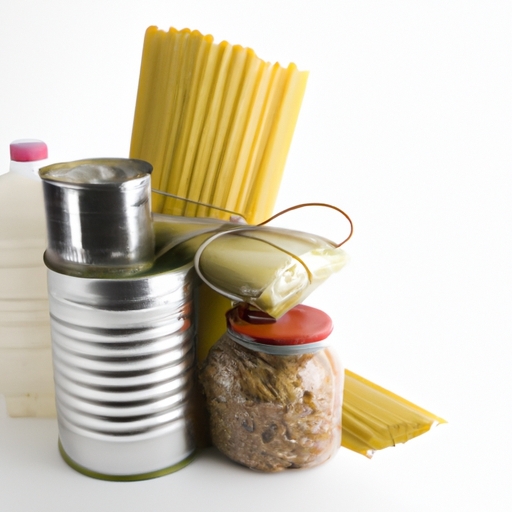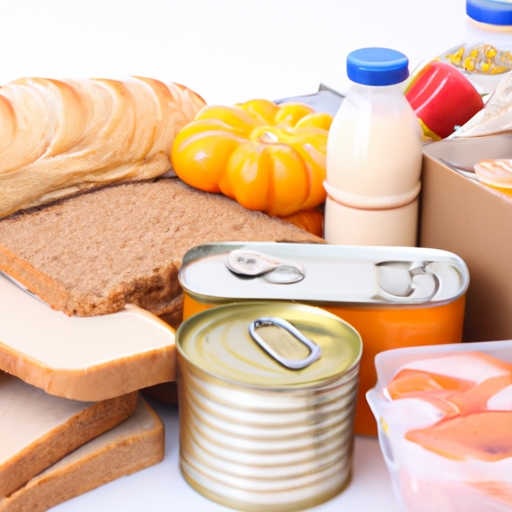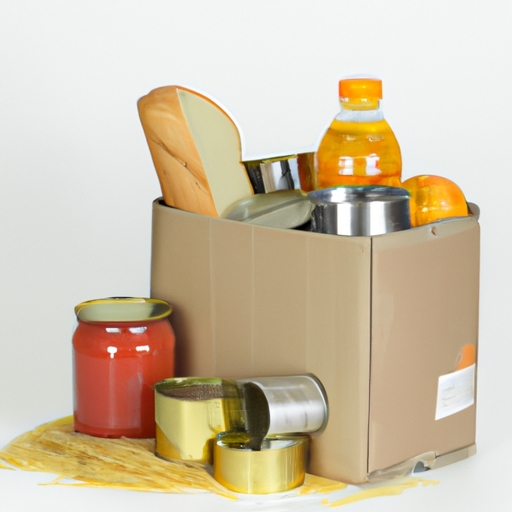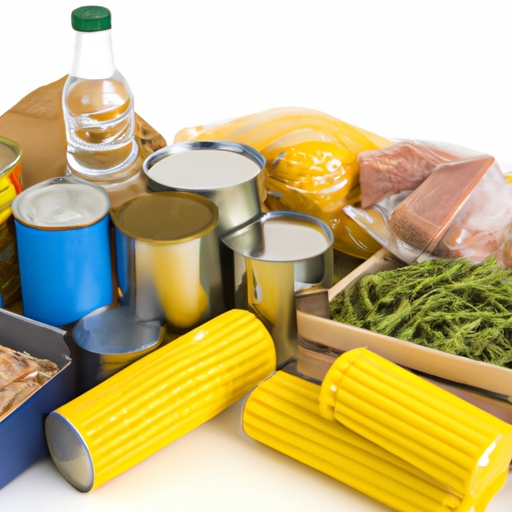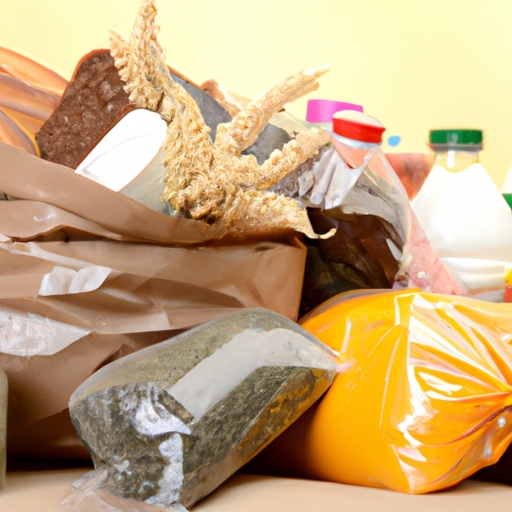Emergency Survival Food Storage
Introduction & Overview of Emergency Survival Food Storage
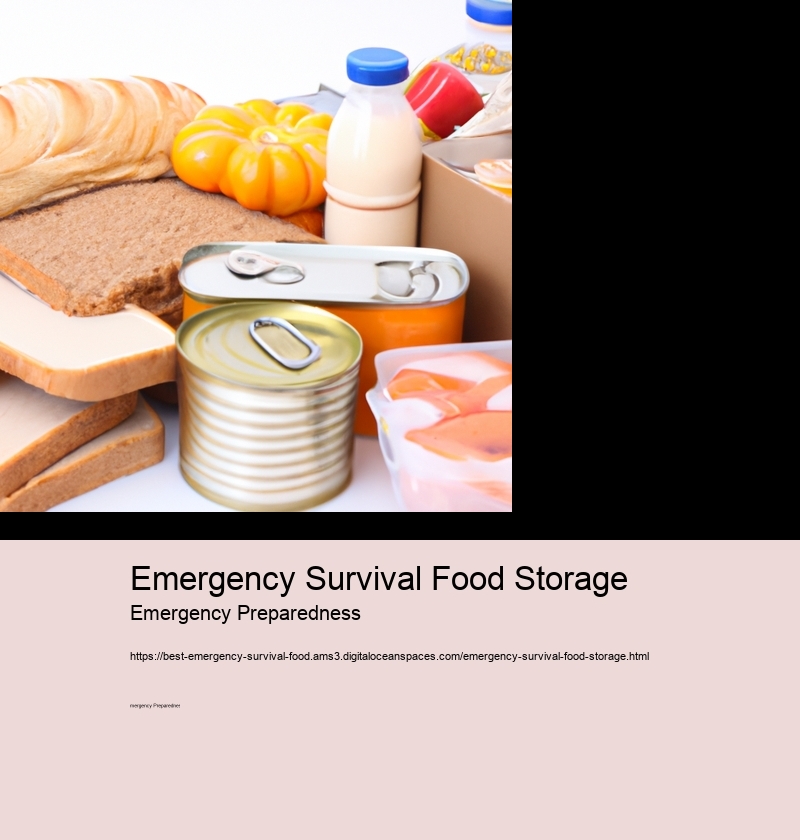
Introduction & Overview of Emergency Survival Food Storage
Emergency survival food storage is a vital part of any prepper's go-bag. It is essential to have an adequate supply of non-perishable food that can be eaten in the event of an emergency. Food storage allows for quick access to nutrition and sustenance during times of crisis or natural disasters.
However, it's not enough to simply buy canned goods or prepackaged meals and hope for the best. Properly preparing and storing food can make all the difference when it comes to having enough sustenance during a devastating situation. (This includes packing foods with long shelf-lives such as dried beans, rice, grains, nuts, seeds, etc). Additionally, consider rotating pantry items every few months so spoilage doesn't occur.
Moreover, there are various methods used for preserving food—such as canning and dehydrating—which help extend shelf life significantly! These techniques allow you to store large quantities of produce without fear of spoilage; plus they don't require electricity or refrigeration either. For those who live in rural areas where power outages are common, this makes them a particularly good option!
In conclusion, emergency survival food storage is a key element to any prepper's plan. It requires some forethought and preparation but ultimately pays off in spades if an unexpected disaster strikes. As always: stay safe & prepared!
Types of Food to Store for Emergencies
Food is one of the most important items to store for emergencies. Without it, (survival) can be difficult and even impossible! Having a variety of foods on hand can help ensure that you have enough nutrients and energy to last during an emergency.
When preparing for emergency food storage, there are many types of food to consider. One option is canned goods, such as vegetables, fruits, beans, and soups. Canned goods provide necessary nutrition without having to worry about spoilage or expiration dates. Another great choice is freeze-dried or dehydrated foods: these can last for years and only require rehydration prior to consumption. Furthermore, grains like rice and pasta as well as nuts will also make excellent long-term options since they can be stored in airtight containers in a cool location.
Additionally, non-perishable snacks such as jerky, trail mix bars, crackers, dried fruit would also be beneficial in providing quick burst of energy when needed. Milk powder and powdered eggs are other excellent sources for protein; while peanut butter or nut butters are great sources of healthy fats! Lastly don't forget condiments such as salt and pepper which will enhance the taste of your meals during tough times!
In conclusion, having a variety of types of food stored away for emergencies will help prepare you should the need arise. Choose something from each category mentioned above so that you'll have all the essential nutrients needed to survive any situation!
Benefits of Having an Emergency Food Supply
Having an emergency food supply is incredibly important for survival during a crisis. It can be the difference between life and death, (especially in a long-term disaster.) There are many benefits of having an emergency food supply, such as: providing vital nutrition when grocery stores are closed; ensuring you have enough to eat if your income is disrupted; and being able to provide for your family in case of an emergency!
Not only does having an emergency food supply make you more prepared for any type of crisis, it also gives you peace of mind knowing that you have something to fall back on. Knowing that there's something in place in case things go wrong can help eliminate stress and anxiety. Plus, having extra foods on hand can give you more options when it comes to cooking meals at home.
Another major benefit of having an emergency food storage is that it can save money over time compared to buying groceries regularly. This isn't just true during a crisis; anytime you're able to take advantage of discounts or sales on canned goods or other non-perishable items, it pays off big time! Furthermore, storing dry goods at home allows you to buy larger amounts at once which helps cut down trips to the store.
Finally, having an emergency food storage allows us all to contribute towards creating a more sustainable future by decreasing our reliance on processed foods from companies who use unsustainable materials like plastic packaging. Instead, we can opt for bulk ingredients which require less packaging and often come with greater nutritional value. Additionally, using bulk ingredients means we won’t be throwing away excess packaging or dealing with spoilage from fresh produce due to expiration dates!
Overall, there are many advantages of having an emergency food supply – both now and into the future! By preparing ourselves now with proper storage methods we ensure that we'll always have access to nutritious meals no matter what happens. And isn't that really what surviving any kind of disaster is all about? Transitionally speaking, these benefits show us why investing in an emergency food supply should be a priority for everyone!
How to Create an Emergency Food Storage Plan
Creating an emergency food storage plan can be a daunting task. But don't fret! With some careful planning and prep, you can ensure that your family has enough sustenance to get through even the toughest times. (First,) it's essential to determine your needs. How many people are in your household? What kind of dietary restrictions do they have? What is the expected duration of the emergency situation? These questions should provide a solid foundation for creating your plan.
Next, consider what type of food you'll need to store. Non-perishable items such as canned goods, dried beans, and rice are excellent choices! Be sure to include plenty of vitamin-rich vegetables too - they'll help maintain good health during times of stress. Don't forget about snacks either; no one likes feeling cranky due to hunger pangs!
Now that you have your shopping list ready, it's time to start stocking up. You may want to shop in bulk: not only will this save money, but it will also minimize trips out into the world during an outbreak or other disaster situation. Make sure you check expiration dates carefully before purchasing anything - especially if you're buying in bulk! Also keep an eye out for sales or discounts; these can really add up over time and help stretch your budget further.
Finally, set reminders for yourself so that you can rotate stocks every few months or so (this way,) nothing gets forgotten about and all food stays fresh! Additionally, remember to practice regular safety measures when storing food; make sure any perishable items stay refrigerated and dry goods remain sealed tightly in their containers. With these tips in mind, you'll be well on your way towards creating a successful emergency food storage plan!
Tips for Creating a Sustainable Emergency Food Supply
Creating a sustainable emergency food supply can be an intimidating task. It requires not only physical sustenance (food) but also an understanding of how to effectively store it and use it in case of emergencies. However, with some careful planning and guidance, it is possible to make sure that your emergency food supply lasts for as long as you need it!
Firstly, remember to buy enough food for the right amount of time; this means buying enough to last the duration of any potential crisis or disaster. This could include items such as canned foods, dry goods, and even freeze-dried meals. Don't forget about consumables as well like salt, sugar and spices - these will help season your meals should you run out of fresh produce! Additionally, consider purchasing non-perishable items which have a longer shelf life such as nuts & seeds or energy bars.
Secondly, make sure you properly store your supplies in airtight containers and keep them in cool dark places away from direct sunlight and away from pests. Keep track of expiration dates carefully so that nothing goes bad before its time! Also ensure that all products are sealed correctly so that no moisture enters the package which could lead to spoilage.
Finally (and perhaps most importantly!) be sure that you have access to clean drinking water; this may mean having bottled water stored on hand or having a way to purify tap water if needed. Water is essential for survival during any disaster situation so don't neglect this important step!
In conclusion, creating a sustainable emergency food supply doesn't have to be daunting - just follow these simple tips and you'll be ready for whatever comes your way! With careful preparation and planning, anyone can create an effective emergency food storage system that will last through any crisis or disaster!
Storing Your Emergency Food Supplies Safely and Properly
Storing your emergency food supplies safely and properly is essential for survival during an emergency. Neglecting to take the proper precautions when storing food can result in dangerous health risks (such as food poisoning), so it's important to pay close attention when organizing your supplies.
First, make sure that you've purchased enough non-perishable items to last for at least two weeks if necessary. This includes canned goods, dry snacks, and shelf-stable milk products. Next, find a place where you can store them securely - ideally a cool, dark location like a basement or closet. You'll also want to keep any perishables in the refrigerator or freezer until they're ready to be cooked and eaten.
Finally, rotate your foods regularly; this means discarding older items first and using newer ones before their expiration dates! Additionally, always wash hands thoroughly before handling any of your emergency supplies or cooking with them. By doing these simple things we can ensure our food will be safe and nutritive should the need arise!
In conclusion, having an organized plan for storing your emergency food is key to keeping yourself healthy during difficult times. Taking the right steps now can save you from a lot of trouble later on!
Rotating Through Your Stockpile Regularly
Emergency survival food storage is a vital part of any disaster-preparedness plan. To ensure that your family has enough nutritious and non-perishable food to last in case of an emergency, it's important to regularly rotate through your stockpile! (This way,) You can avoid having expired goods or items you don't actually need.
It's also important to take stock of what food you have on hand, so you know which ingredients you need to keep replenishing. If you've got canned vegetables, for instance, and they're not getting used up quickly enough, then maybe think about swapping them out for something like freeze-dried fruits or nuts. Similarly, if there are certain staples that everyone enjoys eating in your house, make sure there's always plenty of those around too!
Moreover, it's crucial to check the expiration dates on all stored foods. Over time, the nutritional value of some products can diminish and the taste may suffer as well - yuck! (So,) Be sure to rotate through your supply often and discard anything that doesn't look or smell right. This will help keep your family safe from potential contamination risks as well!
In conclusion, rotating through your stockpile on a regular basis is essential for maintaining a healthy emergency food storage system. This ensures that everyone at home will have access to fresh nourishment when needed - no matter what disaster comes their way. So be prepared: get into the habit of rotating through your supplies today!!
Conclusion
Emergency survival food storage is an important part of being prepared for unexpected events. Knowing what to do and having the right supplies can make a huge difference in a crisis! (Negation) Without proper planning, you may not have enough food or water to last during an emergency situation.
(Transition phrase) However, by taking some simple steps you can ensure that your family has access to essential sustenance. One of the most important steps is determining what types of food are best for storing in an emergency situation.
Canned goods, dehydrated foods, and freeze-dried items are all good options since they don't require refrigeration and have a long shelf life if stored properly.(Contraction) You'll also want to pay attention to the expiration dates on these items so none go bad. Additionally, it's helpful to store non-perishable snacks such as nuts or dried fruit that will provide energy and nutrition when needed.
Finally, remember to consider any special dietary needs your family may have in an emergency situation! This could include items like gluten-free or lactose-free products. Having the right foods on hand can make sure everyone has access to nutritional meals in case of an emergency!
In conclusion, with some thoughtful planning it's possible to create a reliable emergency survival food storage system that will keep your family safe and nourished no matter what comes their way!
